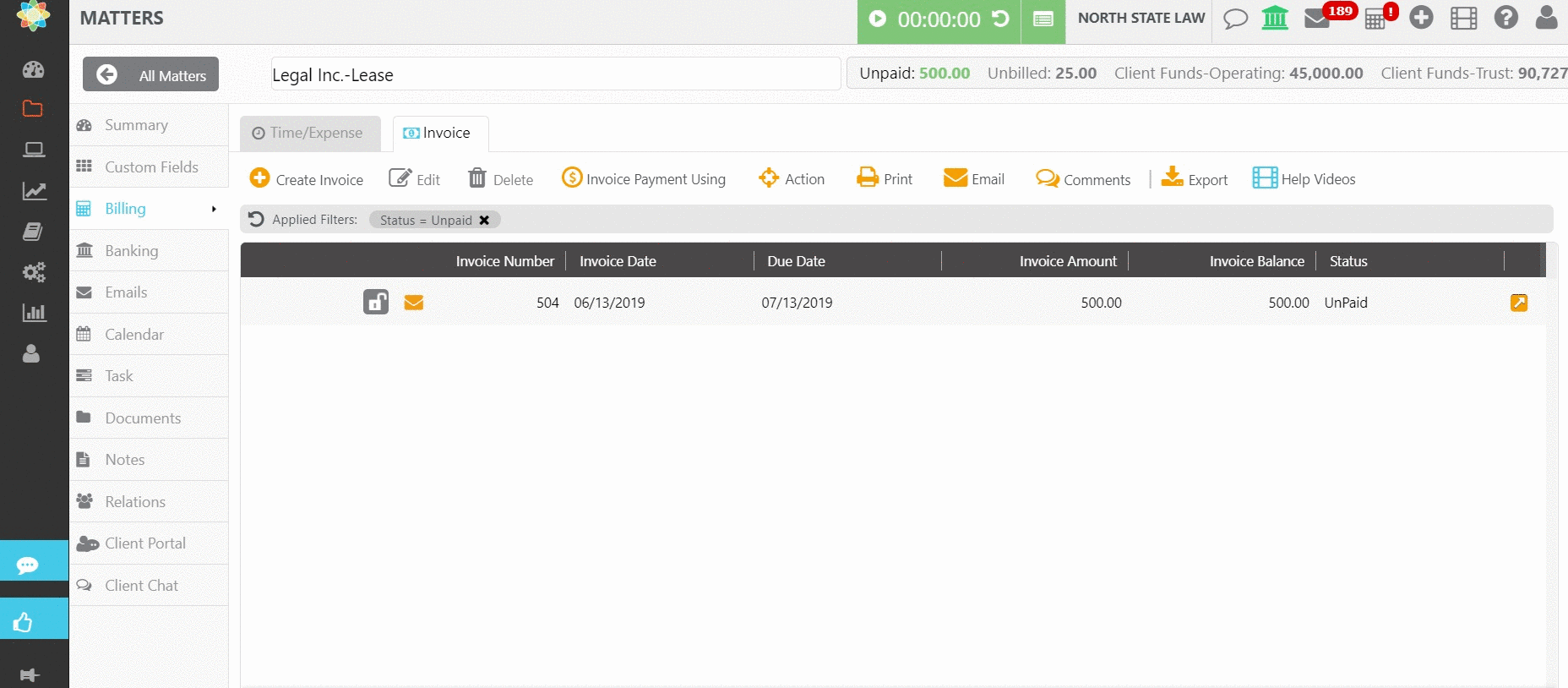When you create an invoice, you can click the icon beside the finance charges field to view the calculation variables:

When creating a new invoice, CosmoLex calculates finance charges for every previously issued, but unpaid invoice, accordingly:
| Due Date Including Grace Days |
|
|---|---|
| Overdue Amount |
|
| Total Overdue Days |
|
| Previously Billed Days |
|
| Current Overdue Days |
|
| New Finance Charge |
|
These calculations are repeated for each previously issued but unpaid invoice:
- Before the total finance charge is applied
- The first time you generate the invoice
Any changes to unpaid invoices will not be reflected in this calculation. However, clicking the lock icon beside the Finance Charge field prompts you to a manual calculation of finance charges, if desired.

Calculation Example
This example assumes a 12% annual simple interest rate with a 10-day grace period.
- A firm generates invoice #1 for $1000 on 1/1/2020 with a 2/1/2020 due date.
- The firm generates invoice #2 for $2500 ($1500 in new charges plus the $1000 previous balance) on 2/1/2020. No finance charge is applied as there is no overdue invoice as of 2/1/2020.
- The firm generates invoice #3 on 3/1/2020. Invoice #1 is 18 days past due after the application of the grace period [3/1/2020 minus (2/1/2020 + 10 days)], so finance charges will be applied.
- The firm generates invoice #4 on 4/1/2020:
- Finance charges will apply to the balances for invoices #1 and #2.
- For invoice #1, only 31 days of finance charge is applied. The total overdue days = 49, but 18 of those days were billed on 3/1/2020.
- For invoice #2, the finance charge applies to 21 days [4/1/2020 minus (3/1/2020 + 10 days)].
Important to Know
- CosmoLex provides finance charge calculations only as a convenience.
- While we provide itemized details of how finance charges are computed, CosmoLex makes no warranty of representation, express or implied, that the finance charges computed are in compliance with applicable laws or rules of professional conduct. Such compliance is the exclusive responsibility of the law firm.
- Finance charges are calculated only at the time of invoice generation based on the overdue amounts and overdue days, what has already been billed, and interest settings at the time of invoice creation. All calculations are localized along with the invoice and do not automatically update regardless of actions taken with previous invoices upon which these amounts are based. Subsequently, on edit, it does not change as balances are a dynamic number. However, you can manually recalculate your finance charge calculations.
- If the user has Operating or Trust retainers (unapplied payments) as well as overdue amounts, they should apply payments to previous invoices first. Otherwise, finance charges would be computed on higher overdue amounts.
- This situation arises when new customers migrate their prior invoices to CosmoLex: for a matter, do not switch from manual finance charges on earlier invoices to automatic finance charges on future invoices. If you make the switch, CosmoLex will compute finance charges on all prior invoices as it will not find any Previously Billed Overdue Days even if you included the charges using manual calculations. This will result in an excessive finance charge calculation.
